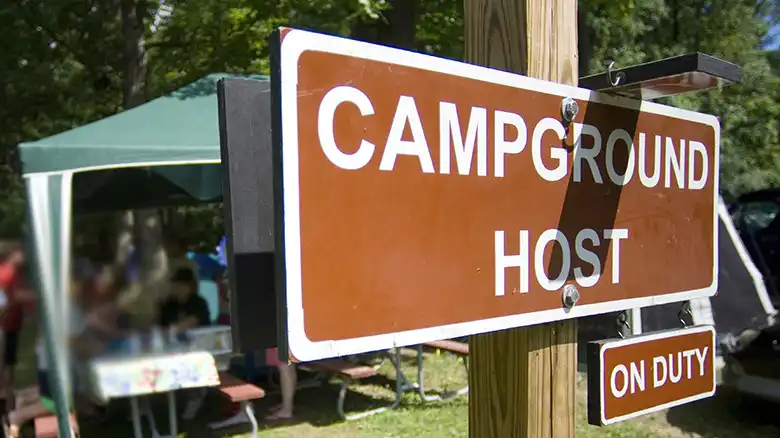Recreational Vehicles (RVs) are a popular choice for travelers looking to explore the open road in comfort and style. However, one of the essential aspects of RV ownership is knowing how to park and store your RV safely and efficiently.
Today, we will discuss about RV parking space dimensions and requirements, covering various types of parking spaces, optimal grounds for parking, and frequently asked questions.
Typically, RV parking space is usually 20/10. However, for a more detailed answer, please continue reading below.

RV Parking Space Sizes Explained
RVs come in various shapes and sizes, and so do the parking spaces designed to accommodate them. The dimensions of an RV parking space can significantly impact your ability to park comfortably and safely. Let’s explore the typical dimensions for different types of RV parking spaces:
Standard RV Parking Space
- Length: A standard RV parking space typically ranges from 20 to 40 feet in length.
- Width: The width of a standard space varies, but it should be at least 10 feet wide.
- Height: Ensure that the parking space has sufficient overhead clearance to accommodate your RV’s height, including any rooftop accessories or satellite dishes.
Towable RV Parking Space
- For those with towable RVs, you need to consider not only the dimensions of your RV but also the towing vehicle and any additional length added by the hitch. Parking spaces for towable RVs are often longer, with a typical length of 50 to 60 feet or more.
Class A Motorhome Parking Space
- Class A motorhomes are the largest RVs and require substantial parking space.
- Length: These vehicles can be as long as 45 feet, so the parking space needs to be around 60 to 70 feet to accommodate them comfortably.
Class B and Class C Motorhome Parking Space
- Smaller Class B and Class C motorhomes are more flexible when it comes to parking space. A parking space of 40 to 50 feet in length and 10 to 12 feet in width should suffice for most of these RVs.
How Much Space Does Your RV Actually Need?
The amount of space required to park an RV goes beyond its physical dimensions. You must also consider maneuvering space, slide-outs, and access for hooking up utilities. Here’s a breakdown of the space requirements:
Maneuvering Space: To safely navigate and park your RV, you’ll need extra space around the parking spot. Allow for a minimum of 10 feet of clearance on all sides for Class A and larger RVs, and 5 feet for smaller RVs.
Slide-Outs: If your RV has slide-outs, make sure to account for their extension. Check the manufacturer’s specifications for the full extended width of your slide-outs, and ensure that your parking space provides sufficient clearance.
Utility Hook-Ups: Many RV parking spaces come with utility hookups, including electricity, water, and sewer connections. Ensure your RV has easy access to these utilities without overcrowding the parking space.
Types of RV Parking Spaces Available
RV enthusiasts can park their vehicles in various types of locations, each offering different types of parking spaces. Let’s explore the options:
Parking Lots: Many RV owners opt for parking lots, such as those at shopping centers or truck stops, for short-term stays. These parking spaces are generally designed for larger vehicles, offering ample space for RVs. However, be prepared to pay a fee or purchase something from the establishment in exchange for the parking privilege.
Camping Grounds: Campgrounds and RV parks are popular destinations for RV enthusiasts. These places provide designated RV parking spaces equipped with hook-ups for electricity, water, and sewage disposal. The dimensions of these spaces can vary, so it’s essential to check with the specific campground or park.
RV Parks: RV parks are specifically designed to cater to the needs of RV owners. These parks offer spacious RV parking spaces with amenities like picnic tables, fire pits, and easy access to communal facilities. RV parks are known for offering a variety of space sizes, accommodating different types of RVs.
Private Property: Some RV owners have the option to park on private property, such as a friend or family member’s land. The space available in such cases can be quite flexible, but it’s crucial to ensure you have the owner’s permission and adhere to local regulations.
Ideal Ground Surfaces for RV Parking
Parking your RV on the right type of ground is crucial for stability and safety. Here are the best grounds for parking your RV:
Paved Surfaces: Paved parking lots, driveways, or RV pads provide a stable and level surface for parking. They are less prone to erosion and offer better drainage. Paved surfaces are especially ideal for longer-term RV storage.
Gravel or Crushed Stone: Many RV enthusiasts prefer parking on gravel or crushed stone surfaces because they offer good drainage and stability. They’re also suitable for shorter stays.
Concrete Pads: RV owners looking for ultimate stability often opt for concrete pads. These provide a level and durable surface but might be harder to find in some locations.
Grass or Dirt: While parking on grass or dirt can be cost-effective, it may not be ideal for extended stays. These surfaces can become muddy in wet conditions and are not as level as other options.
RV Parks and Campgrounds: These facilities typically offer a combination of paved, gravel, and grass parking spaces. The type of ground can vary, so it’s essential to check the specifics of the RV park or campground you plan to visit.
Questions Your Creative Mind Can Ask
1. Can I park my RV on the street in a residential area?
Parking regulations vary by location, so it’s essential to check with local authorities and adhere to any municipal ordinances. In many cases, overnight street parking for RVs is restricted.
2. Do I need any special permits to park my RV in certain areas?
Some areas, especially urban or residential neighborhoods, may require special permits for RV parking. Check with local authorities or property owners to ensure you are in compliance.
3. Can I park my RV in my driveway?
Depending on local regulations and the dimensions of your driveway, parking an RV in your driveway may be possible. Be sure to check local restrictions and consider whether your RV can fit comfortably.
4. Are there any specific guidelines for boondocking (dry camping) with an RV?
Boondocking typically refers to off-grid camping without hook-ups. It’s essential to research areas where boondocking is permitted and to be self-sufficient with utilities.
Conclusion
Understanding RV parking space dimensions and requirements is essential for all RV owners. Whether you have a compact Class B motorhome or a spacious Class A, knowing the dimensions, space requirements, and best grounds for parking your RV is crucial. By following the guidelines outlined in this article and checking local regulations, you can ensure a safe and enjoyable RVing experience.


